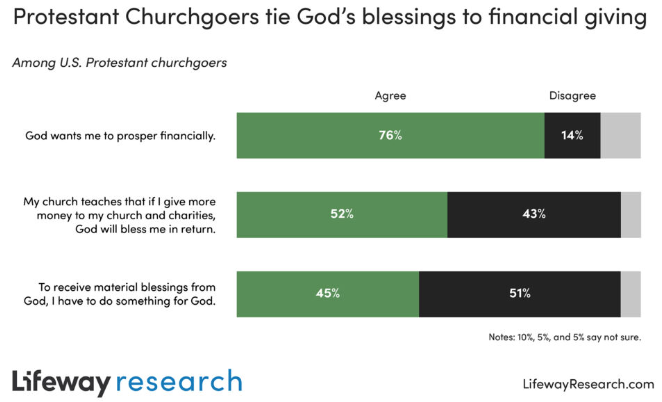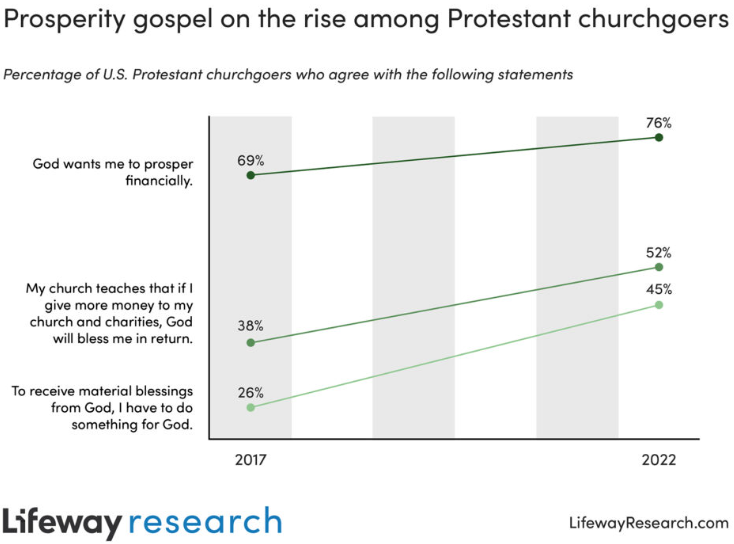Just over half of Protestant churchgoers in the United States say their houses of worship promote the belief that God grants financial blessings to those who give money to churches and charities, according to Lifeway Research.
A new Lifeway survey found 52% of American Protestant churchgoers said they hear that prosperity gospel message in their churches, up from 38% who said so in 2017. Almost a quarter in the 2023 study said they strongly agreed that this is preached in their churches.
“Additionally, churchgoers are more likely today than in 2017 to believe God wants them to prosper financially (76% v. 69%) and that they have to do something for God in order to receive material blessings from him (45% v. 26%),” a Lifeway Research report said.
Of the 76% of Protestant churchgoers who agreed God wants them to prosper financially, 43% strongly agreed and 45% said they have to do something to get those blessings from God, with 21% strongly agreeing.

The “prosperity gospel,” most associated with televangelists, has been denounced by Southern Baptists and Mainline Protestants as heresy.
Scott McConnell, executive director of Lifeway Research, said it’s possible the financial hardship imposed by the COVID-19 pandemic may explain part of the reason why prosperity gospel teachings and beliefs are rising.
“In the last five years, far more churchgoers are reflecting prosperity gospel teachings, including the heretical belief that material blessings are earned from God,” he said. “It is possible the financial hits people have taken from inflation and the pandemic have triggered feelings of guilt for not serving God more. But Scripture does not teach that kind of direct connection.”
Fundamental theological misconceptions also may be driving the rise in prosperity beliefs and teachings, the Lifeway report added. “As people interact with the world around them, their beliefs about the world and their place in it stem from their understanding (or misunderstanding) of the character of God. And most churchgoers believe God wants them to prosper financially.”
That belief is especially prevalent among younger and less-educated Protestants. According to the survey, 81% of churchgoers ages 18 to 34 and 85% of those between 35 and 49 said God desires they prosper financially. Among churchgoers with high school diplomas or less education, 81% agreed as did 80% of those with some college. However, agreement drops noticeably among those who have completed bachelor’s and master’s degrees, to 67% and 65%.

The survey also found belief in the prosperity gospel to be more prevalent in some denominations than others, with Methodists leading the way at 93% and Restorationists, which includes groups such as the Disciples of Christ and Churches of Christ, close behind at 88%. Evangelicals were more likely to believe God wants them to prosper than non-evangelicals, at 80% versus 74%.
“Pursuing holiness was never designed by God to be a plan for financial riches,” McConnell said. “The size of one’s finances is not the measure of anyone’s service to God nor relationship with him.”
Sizeable numbers reported their churches are teaching prosperity gospel beliefs, including that giving money to charities and churches will prompt God to respond with financial rewards.
That included 63% of churchgoers ages 18 to 34 and 66% of those 35 to 49, Lifeway said. By comparison, just over half of respondents ages 50 to 64 said their churches promote that belief, while only 31% of those 65 and holder said the same.
“This research does not rule out the possibility that biblical teachings were poorly heard by more young adults, but they definitely have experienced a lack of clear biblical teaching on the reason for generosity,” McConnell said. “Large numbers of young adults attending church regularly still believe their good deeds can tilt God’s gifts in their direction.”
When analyzed according to race, Black churchgoers led in saying their churches teach God will reward them for giving money to charities and congregations, at 71%. Those who attend church up to three times monthly were more likely to say that about their churches (57%) than those who attend a minimum of four times a month (49%).
“Churchgoers without evangelical beliefs are more likely than those with such beliefs to say their church teaches that if they give more money, God will bless them (55% v. 48%). The opposite was true five years ago when 41% of evangelicals agreed and 35% of non-evangelicals agreed.”
Related articles:
When ‘gospel’ is no gospel at all | Opinion by Jakob Topper
Prosperity gospel may reap windfall from Trump presidency


